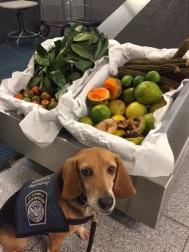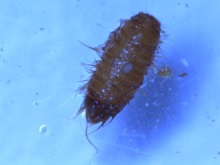ATLANTA — U.S. Customs and Border Protection (CBP) Office of Field Operations agriculture specialists and members of our “Beagle Brigade” canine at Hartsfield-Jackson Atlanta International Airport (ATL) teamed up to intercept nearly 85 pounds of prohibited exotic fruit, peppers, leaves, chicken and a dangerous Khapra Beetle.

stopped this prohibited fruit
at ATL airport
On February 5, CBP agriculture specialist and K9 Chevee alerted on a traveler’s checked bags that arrived from Ecuador. During the inspection process a collection of fruit, tomatoes, ice cream beans and 22 pounds of pork sausage were found.
“Customs and Border Protection’s agriculture inspection and protection mission is a critical trade enforcement priority,” said Carey Davis, CBP Port Director for the Area Port of Atlanta. “CBP’s agriculture specialists and our Beagle Brigade work side by side to detect and intercept prohibited food items, invasive weed seeds and insects, and plant and animal diseases that pose a significant threat to U.S. agricultural industries and our nation’s economy.”
CBP agriculture specialists on February 12, working with K9 Murray, alerted to suitcases belonging to a traveler who also arrived on a flight from Ecuador. CBP agriculture specialist found holly leaves, nuts and 11 pounds of raw chicken during the examination process.
In late January, lemons, seeds and wheat was discovered in luggage after a family arrived from Saudi Arabia. CBP agriculture specialist performed a closer inspection of the wheat revealing a suspected live Khapra Beetle. The specimen was sent to U.S. Department of Agriculture laboratory and they confirmed the insect was a Khapra Beetle, one of the world’s most destructive pests

this dangerous Khapra Beetle at
ATL airport
The seized food products were destroyed and the travelers were not penalized though warned about properly declaring of agriculture products to CBP.
Travelers can check the general admissibility of fruits and vegetables by consulting the Animal and Plant Health Inspection Service website or the Fruits and Vegetables Import Requirements database.
On a typical day in fiscal year 2017, CBP agriculture specialists discovered 352 pests at U.S. ports of entry and 4,638 materials for quarantine.
To find out more about CBP operations in Georgia and the Southeast, visit @CBPSouthEast on Twitter.

